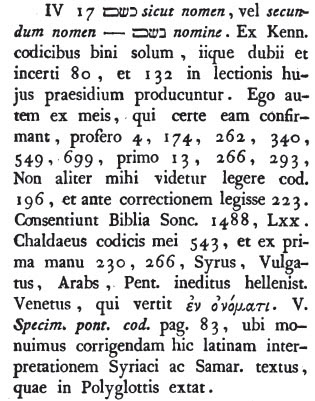ࠅࠉࠃࠏ ࠒࠉࠍ ࠀࠕ ࠀࠔࠕࠅ ࠅࠕࠄࠓ ࠅࠕࠋࠃ ࠀࠕ ࠇࠍࠅࠊ ࠅࠉࠄࠉ ࠁࠍࠄ ࠏࠉࠓ ࠅࠉࠒࠓࠀ ࠀࠕ ࠔࠌ ࠄࠏࠉࠓ ࠊࠔࠌ ࠁࠍࠅ ࠇࠍࠅࠊ
Gen 4:17 [Samaritan Pentateuch]
וידע קין את אשתו ותהר ותלד את חנוך ויהי בנה עיר ויקרא את שם העיר כשם בנו חנוך׃
Gen 4:17 [Masoretic Text]
וַיֵּ֤דַע קַ֨יִן֙ אֶת־אִשְׁתֹּ֔ו וַתַּ֖הַר וַתֵּ֣לֶד אֶת־חֲנֹ֑וךְ וַֽיְהִי֙ בֹּ֣נֶה עִ֔יר וַיִּקְרָא֙ שֵׁ֣ם הָעִ֔יר כְּשֵׁ֖ם בְּנֹ֥ו חֲנֹֽוךְ׃
Gen 4:17 [Samaritan Targum]
וחכם קין ית אתתה ובטנת ואולדת ית חנוך והוה בנה קרתה וזעק ית שם מדינתה כשם ברה חנוך:
And Qayin knew his wife, and she conceived and bore Ḥanokh. And he was building a city, and he called the name of the city after the name of his son, Ḥanokh.
| Number | Hebrew | Samaritan | Translation |
|---|---|---|---|
| 1 | וידע | ࠅࠉࠃࠏ | And he knew |
| 2 | קין | ࠒࠉࠍ | Cain |
| 3 | את | ࠀࠕ | (direct object marker) |
| 4 | אשתו | ࠀࠔࠕࠅ | His wife |
| 5 | ותהר | ࠅࠕࠄࠓ | And she conceived |
| 6 | ותלד | ࠅࠕࠋࠃ | And she gave birth |
| 7 | את | ࠀࠕ | (direct object marker) |
| 8 | חנוך | ࠇࠍࠅࠊ | Enoch |
| 9 | ויהי | ࠅࠉࠄࠉ | And it came to pass |
| 10 | בנה | ࠁࠍࠄ | He built |
| 11 | עיר | ࠏࠉࠓ | A city |
| 12 | ויקרא | ࠅࠉࠒࠓࠀ | And he called |
| 13 | את | ࠀࠕ | (direct object marker) |
| 14 | שם | ࠔࠌ | The name |
| 15 | העיר | ࠄࠏࠉࠓ | Of the city |
| 16 | כשם | ࠊࠔࠌ | After the name |
| 17 | בנו | ࠁࠍࠅ | Of his son |
| 18 | חנוך | ࠇࠍࠅࠊ | Enoch |
Morphology
- וַיֵּ֤דַע (wayyēḏaʿ) – Root: ידע (y-d-ʿ); Form: Qal wayyiqtol, third masculine singular; Translation: “And he knew”; Notes: Refers to the intimate knowledge of his wife.
- קַ֨יִן֙ (Qayin) – Root: קין (q-y-n); Form: Proper noun; Translation: “Qayin”; Notes: The subject of the action.
- אֶת־אִשְׁתֹּ֔ו (ʾeṯ-ʾišṯō) – Root: אשה (ʾ-š-h); Form: Direct object marker אֶת + noun, singular feminine with third masculine singular suffix; Translation: “his wife”; Notes: Refers to Qayin’s spouse.
- וַתַּ֖הַר (wattaḥar) – Root: הרה (h-r-h); Form: Qal wayyiqtol, third feminine singular; Translation: “and she conceived”; Notes: Indicates the beginning of pregnancy.
- וַתֵּ֣לֶד (wattēleḏ) – Root: ילד (y-l-d); Form: Qal wayyiqtol, third feminine singular; Translation: “and she bore”; Notes: Refers to giving birth.
- אֶת־חֲנֹ֑וךְ (ʾeṯ-ḥănōḵ) – Root: חנך (ḥ-n-k); Form: Direct object marker אֶת + proper noun; Translation: “Ḥanokh”; Notes: The name of Qayin’s son.
- וַֽיְהִי֙ (wayhî) – Root: היה (h-y-h); Form: Qal wayyiqtol, third masculine singular; Translation: “And he was”; Notes: Introduces the following action.
- בֹּ֣נֶה (bōneh) – Root: בנה (b-n-h); Form: Qal participle, singular masculine; Translation: “building”; Notes: Describes Qayin’s ongoing action.
- עִ֔יר (ʿîr) – Root: עיר (ʿ-y-r); Form: Noun, singular feminine; Translation: “a city”; Notes: Refers to the settlement being constructed.
- וַיִּקְרָא֙ (wayyiqrāʾ) – Root: קרא (q-r-ʾ); Form: Qal wayyiqtol, third masculine singular; Translation: “and he called”; Notes: Refers to Qayin naming the city.
- שֵׁ֣ם (šēm) – Root: שם (š-m); Form: Noun, singular masculine; Translation: “the name”; Notes: Refers to the designation of the city.
- הָעִ֔יר (hāʿîr) – Root: עיר (ʿ-y-r); Form: Noun, singular feminine with definite article ה; Translation: “of the city”; Notes: Specifies the subject being named.
- כְּשֵׁ֖ם (kĕšēm) – Root: שם (š-m); Form: Preposition כְּ + noun, singular masculine; Translation: “after the name of”; Notes: Indicates the basis for the naming.
- בְּנֹ֥ו (bĕnōw) – Root: בן (b-n); Form: Noun, singular masculine with third masculine singular suffix; Translation: “his son”; Notes: Refers to Ḥanokh.
- חֲנֹֽוךְ (ḥănōḵ) – Root: חנך (ḥ-n-k); Form: Proper noun; Translation: “Ḥanokh”; Notes: Repeats the name of the son after whom the city was named.
